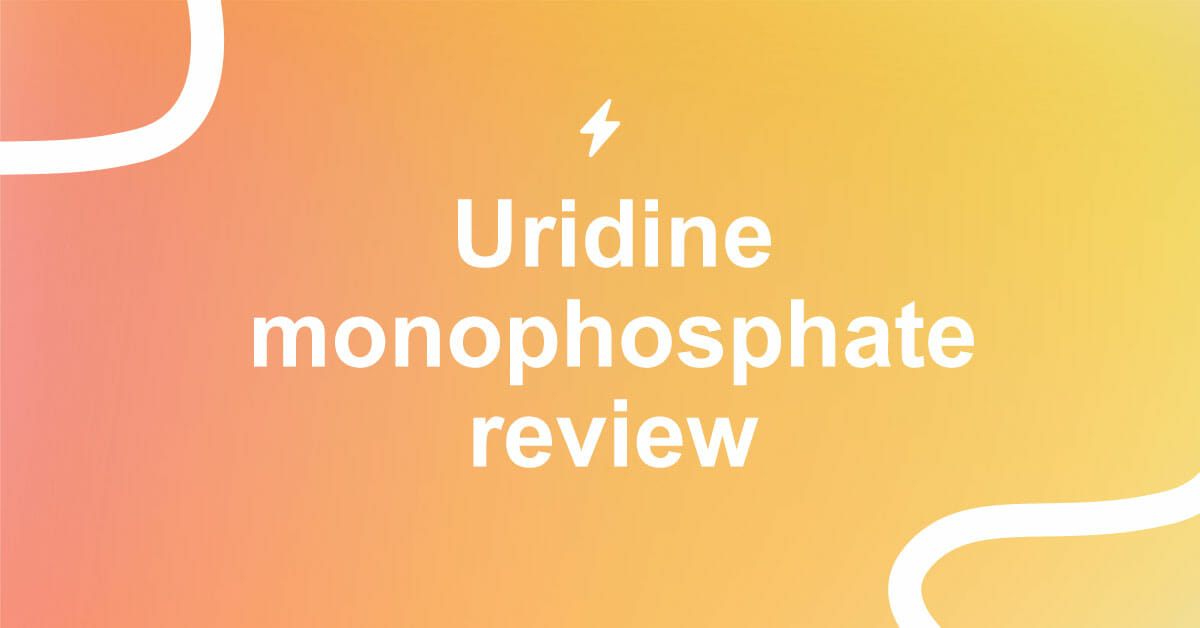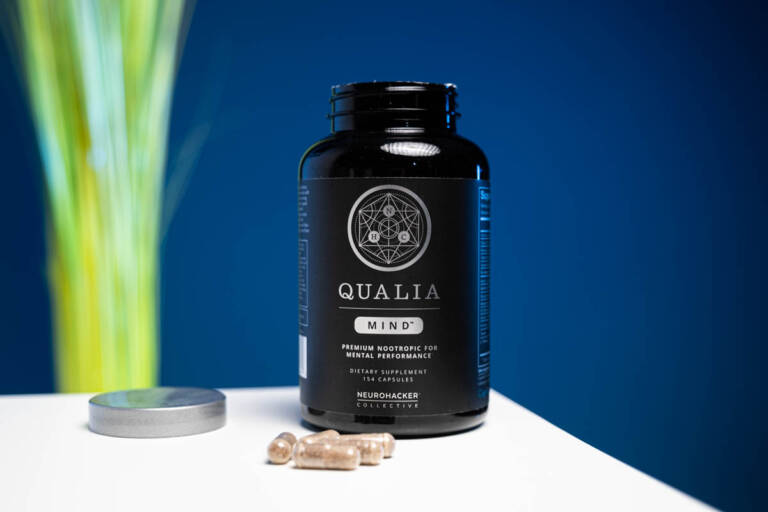Uridine monophosphate is a naturally occurring phospholipid and a basic building block of the body. It is an integral component of docosahexaenoic acid (DNA) and ribonucleic acid (RNA) and is present in all the cells of the body.
Since it operates as one of the nucleotide basics in the RNA chain, when uridine levels are off, it isn’t unusual to find negative brain function conditions such as memory disorders, attention deficiency, anxiety, depression, and more.

Uridine is conveniently available in foods such as broccoli, beets, fish, mushrooms, oats, parsley, tomatoes, brewer’s yeast, and beer. However, most dietary uridine is broken down by the liver and does not reach the brain.
So, if you want a significant amount of this important nutrient to improve your cognitive function, you should complement it with dietary supplementation.
Luckily, it is available as a supplement in the form of uridine monophosphate. This is a highly bioavailable form of this amino acid that is easily absorbed by the brain.
Also known as 5 Uridylic acid, this form can easily cross the blood-brain barrier, reach the digestive system, and provides much better bioavailability than dietary sources alone.
Working Mechanism Of Uridine 5 Monophosphate
On its own, uridine is integral for various biochemical and physiological processes in the brain. However, most of its benefits are observed when it is combined with a choline supplement, such as alpha GPC or CDP choline which is produced from cytidine triphosphate and phosphocholine.
CDP choline is required for PC synthesis which is a precursor of the essential neurotransmitter acetylcholine, a key player in cognitive functioning.
Uridine assists brain function in the following ways:
Promotes Neurite Outgrowth
Proper synaptic function is crucial for optimal brain health since brain synapses are responsible for transmitting electrical or chemical signals that are vital for memory retention and cognitive function. The more synapses there are in the brain, the better the mind works.
Uridine helps boost the production of neurite outgrowth and restores synaptic protein levels.
Research shows that such neurite outgrowth and dendritic spine density can be increased by concurrently raising brain levels of three circulating brain nutrients, including uridine, omega 3 fatty acids, and choline. [*]
Increasing the number of dendrites per neuron assists healthy cell membranes to form and that can improve the flow of information throughout the nervous system. [*]
Assists Dopamine Release
One of the primary mechanisms of 5 uridylic acid is its potential to boost dopamine levels. This neurotransmitter is linked strongly to higher motivation and reward processing in the brain.
When someone has a problem trying to focus or paying attention, a boost of dopamine release in the brain can give them the much-needed motivation to complete tasks. However, the benefit doesn’t stop here.
Not only is uridine monophosphate intake connected to increasing dopamine levels, but it also speeds up dopamine transmission in the brain. This mechanism can have a range of positive effects on mood, especially when complemented with omega 3s. [*]
Alongside stabilizing dopamine, uridine is also a precursor to the synthesis of acetylcholine which is the most abundant neurotransmitter in the body and responsible for many aspects of cognitive performance. [*]
An increase in the production of acetylcholine can also make the brain process information faster, provide mental clarity, reduce brain fog, and enhance memory.
Acts As A Neuroprotectant
Uridine also contains neuroprotectant elements, which can prevent old age complications such as dementia and Alzheimer’s disease.
Uridine monophosphate can also promote the growth of new neurons and new synapses by increasing the amount of phosphatidylcholine (PC) in the brain.
Phosphatidylcholine is a primary component of practically every single nerve cell in the body, so keeping optimal levels ensures a healthy brain and improved mental function.
It can also protect neurons from the toxic effects of Amyloid β-protein. This is often present in extracellular plaques found in the brains of people suffering from Alzheimer’s disease. [*]
Uridine Monophosphate Benefits
Although uridine is best known for its basic role in RNA formation, its benefits also seem to extend to serve a dietary or nootropic purpose for neuroprotection, brain development, motivation, memory, and mood.
Uridine monophosphate promotes neural synthesis and synapse development. In other words, it helps the brain to repair itself allowing it to make new connections.
This gives it a vast potential to act in the capacity of a nootropic supplement that is very important for various aspects of brain function.
Bipolar Disease
Some research indicates that six weeks of uridine supplementation may help lower symptoms of depression in young bipolar individuals.
One study, including seven participants with bipolar disorder, used uridine monophosphate to prevent depressive symptoms.
Researchers believe that it improved mitochondrial function, which is typically thought to be compromised in bipolar brains. [*]
Another study with 17 healthy individuals indicated that uridine helps improve the phospholipid structure of nerve cell membranes. People with bipolar disorder may also have altered membrane phospholipids. [*]
Seizures And Epilepsy
Although human clinical trials are missing, some evidence from animal studies indicates that uridylic acid may potentially help in preventing and treating epilepsy.
It may be able to repair specific areas of the brain that are responsible for the condition because of the selective increase in neuronal RNA in epileptic regions. However, findings have not presented conclusive results and more research is needed in this area to make proper conclusions. [*]
Huntington’s Disease
Huntington’s disease (HD) is a genetic disorder resulting in the progressive breakdown of neurons in the brain. Some research suggests that uridine monophosphate may be able to manage symptoms by supporting brain regeneration.
One study showed uridine monophosphate to improve motor function and decrease neurodegeneration while increasing BDNF in mice with Huntington’s.
Researchers concluded that supplementing with uridine may be beneficial in treating neurodegenerative conditions such as HD. [*]
Depression
Anecdotal, as well as clinical evidence, suggests that uridine may help manage depression, especially when used within a nootropic stack.
Uridine helps release dopamine and encourages dopamine receptors to grow. As a result, this mechanism may help improve mood and combat depression.
One animal study indicated that uridine monophosphate may boost the number of neurite outgrowths and assist dopamine release. [*]
Another animal study investigated both uridine 5 monophosphate and omega-3 fatty acids together for managing depression.
Researchers found that while both supplements presented antidepressant effects on their own, the two when stacked together, had an even more profound effect on mood with the greatest effects being observed after supplementing for 30 days. [*]
Anecdotally, many nootropic users also claim that stacking uridine with omega 3s and a choline source, such as citicoline or Alpha GPC, can significantly impact mood.
It is theorized that using the three together may normalize the production and output of dopamine and bring about an overall improvement in emotional well-being.
Anti-Inflammatory Mechanism
Uridine acts in an anti-inflammatory capacity in the brain and body based on some initial evidence. This anti-inflammatory potential may have holistic benefits for different conditions. [*]
In addition, uridine monophosphate administration, in in vivo and in vitro experiments shows it to present anti-aging benefits in the gastrointestinal tract where treatment downregulated the Sa-β-gal-positive cells.
It also significantly reduced the levels of inflammation and oxidative stress. Animal studies show that mice fed with uridine had lower aging levels than the control group. [*]
On another front, it has also attracted attention for its anti-inflammatory role in some animal studies involving lung inflammation. Studies indicate that it might exert this effect due to the generation of uridine diphosphate and uridine triphosphate, which are able to bind and activate P2Y2, P2Y4, and P2Y6 receptors.[*]
Research findings show that uridine may have potent anti-inflammatory and antibiotic properties and since it is well tolerated and safe in humans, it may be considered a therapeutic approach for the treatment of fibrotic lung diseases. [*]
Learning And Memory
Uridine is thought to improve memory and learning by boosting neural growth and transmission between nerve cells. As such, it provides optimal conditions for greater neural plasticity and synapse formation, that encourage the brain to adapt, remember, learn, and regrow.
It assists neural growth by providing phosphatidylcholine, which is a primary building block of neurons, and acetylcholine.
Uridine can also promote synaptogenesis and increase BDNF which are integral elements for neurogenesis. [*]
A number of animal trials along with user testimonials reveal that uridine supplementation helps form and retain memories. [*]
Some research also suggests that it may improve memory in case of brain damage or cognitive decline. [*]
In an MIT clinical study, subjects exposed to uridine supplementation were shown to improve their learning and memory skills. Apparently, dopamine and acetylcholine levels also increased when subjects were administered with uridine monophosphate.
In humans, uridine supplements are much more effective for enhancing learning and memory abilities when combined with choline. In the long run, it can prevent Alzheimer’s due to growing synapses, and activity in the brain.
Animal and cell studies show it to increase neurite outgrowth, which is a process that promotes the growth and regeneration of brain cells.
Lastly, uridine enhances dendritic spines that store memory. This has best been observed when uridine has been combined with choline plus DHA to enhance cognitive function.
Uridine also activates P2Y2 receptors, which promote not only nerve growth factor but also the generation of new neurons and the regeneration of damaged and injured ones.
It is important to note that active P2Y2 receptors can even protect neurons from becoming injured and they become more active if there are inflammatory conditions present.
But even though this information is promising, many of these effects have been seen in animal studies only. More clinical trials are needed with human participants to establish these findings.
May Improve Heart Health
Uridine and uridine monophosphate may be helpful in stabilizing blood circulation in instances where there isn’t enough blood flow going through the heart.
Even though human studies are still lacking, uridine monophosphate may improve heart health by activating P2Y2 receptors. In one combined cell and animal study, the activation of P2Y2 receptors boosted blood flow and enhanced blood pressure. [*]
One animal study showed Uridine 5 monophosphate normalizes the heart’s rhythm as it reactivates energy metabolism by restoring glycogen and creatine phosphate reserves depleted by ischemia. [*]
Effective Painkiller
Uridine has also been studied to work as an effective painkiller, reducing pain and inflammation. Studies show that combining an oral supplement of uridine triphosphate, cytidine, and vitamin B12 can reduce pain significantly.
One trial with 400 participants using a combination of vitamin B12 and uridine effectively reduced pain with only mild side effects. The combination worked better than vitamin B12 alone. [*]
Alternately, a combination of uridine monophosphate, vitamin B12, and folic acid may be used as a painkiller for patients with carpal tunnel syndrome.
In one study with 212 participants suffering from peripheral neuropathy, combining uridine with vitamin B12 and folic acid lowered both pain intensity as well as the number of affected areas. [*]
Another study with 48 carpal tunnel patients showed that uridine monophosphate, folic acid, and vitamin B12 lowered pain intensity by around 40%. [*]
Another earlier study looked at the effect of uridine 5 monophosphate, where it bettered nerve health in individuals with diabetic neuropathy, suffering from long-term nerve damage from high blood glucose. [*]
Even though these results seem promising, findings that support the use of uridine for nerve pain management come from very limited clinical trials. And even then, many have used uridine combined with different vitamins. Additional clinical trials are needed for uridine alone to see and confirm these benefits.
May Work As A Sleep Aid
Uridine is normally present in breast milk. To test the efficacy of uridine as a sleep aid, 30 infants diagnosed with a sleep disorder were given cereal that was fortified with uridine 5 phosphate, adenosine 5 phosphate, and tryptophan, to improve their sleep quality.
It was seen that when infants consumed the fortified cereal prior to their bedtime, they slept better throughout the night.
Uridine monophosphate is also considered a possible sleep aid for adults but needs more research to confirm these benefits.
In one animal study, aged rats were given Uridine to promote slow-wave sleep, with promising potential. [*]
Once again, limited studies have looked at using uridine in the capacity of sleep aid and further research is required.
May Prevent Dementia And Alzheimer’s
Uridine, particularly when combined with omega-3 fatty acids, has been shown to enhance synaptic plasticity, which is neuron-to-neuron communication via synaptic protein synthesis and brain cell membrane support.
Some research indicates it improves synaptic protein levels which may otherwise become altered in vascular dementia such as Alzheimer’s. [*]
For the healthy nootropic enthusiasts, this may help clear cognition, but to older users at risk of age-related cognitive decline, this bio effect gives uridine significant neuroprotective potential.
Who Should Take Uridine Monophosphate?
If you are looking for a supplement to work in a nootropic capacity, you may consider taking uridine monophosphate supplements.
It is particularly recommended for individuals who want to amplify the effects of their calling, or for those looking to enhance their motivation levels.
Also, people who feel that they may have become desensitized to dopamine-enhancing supplements can also give uridine monophosphate a try.
Since uridine monophosphate works as a dopamine receptor modulator, it can adjust the sensitivity to your motivation.
Other than this, if all you are looking for is additional brain development benefits such as healthy cell membranes and brain cells, then you can consider taking uridine monophosphate.
However, since uridine is a restorative supplement, it does not kick in immediately as typical stimulants do. Instead, it can take days or even weeks before users start feeling any effects.
Once introduced into the body, the objective is to balance levels and stimulate neuroplasticity. This is often observed after continued use after a couple of weeks before subtle changes are noticed in mood and cognitive abilities.
Uridine Monophosphate Dosage
It is common to take between 300 to 600 mg of uridine monophosphate a day. On its own, it is safe to take between 500 to 1000 mg of uridine monophosphate per day for enhancing cognition.
Uridine monophosphate is also commonly stacked alongside a choline source such as citicoline or alpha GPC and DHA found in fish oil to enhance its benefits. Since it synergizes extremely well with choline, the combination can increase the production of neural cell membranes and improve spatial awareness and selective attention.
When combined with a source of choline, it is recommended to even out the dosage – for example, 500 mg choline plus 500 mg uridine.
Despite all its benefits, uridine has proved to be the most effective when complemented with other supplements such as vitamin B12, citicoline, and DHA. Additionally, introducing a diet rich in uridine-dense foods would give you an edge to capitalize on the supplements.
Expectant or nursing mothers should consult a physician before taking any uridine supplements.
Uridine Monophosphate Side Effects
Uridine monophosphate seems to be very well tolerated without any major reports of side effects.
However, it is possible that very high doses of uridine may cause diarrhea and bring about fever. Also, some people have reported that high coffee consumption when taking uridine may cause irritability.
To avoid any side effects, it is recommended to start taking uridine at the lowest dosage if possible and progress slowly until you find the right balance. People with certain medical conditions should also avoid taking uridine.
This includes cancer patients, as various medical studies show, that uridine may affect cancer patients negatively. The activation of the P2Y2 receptors speeds up the spread of cancer cells, particularly in patients suffering from pancreatic cancer, breast cancer, and prostate cancer.
Another demographic that should monitor uridine supplementation carefully is diabetic patients.
Research related to uridine and diabetes seems to be self-conflicting, whereas one trial done on human cells concluded that uridine helped accelerate insulin production while another research study suggested that uridine could be a negative factor in diabetic patients. [*]
Even though uridine has been shown to improve blood flow and slow down the effects of a heart attack, one study done on mice showed that it induced heart scarring by activating P2Y2 receptors. This can indirectly cause the heart valves to become thicker. For that reason, it isn’t recommended for patients with advanced heart complications. [*]
Uridine may inhibit new bone formation so anyone recovering from a bone fracture should withhold uridine supplements until they have fully recovered.
Uridine Limitations
Even though it seems to boast impressive health benefits both for the brain and body, research on uridine for cognitive enhancement is often co-founded with other nootropic compounds.
In other words, there is a catch for uridine to be effective as a supplement. It must be combined with other supplements such as CDP choline, omega-3 fatty acids, and vitamins to deliver the best results.
To overcome this, you may want to buy uridine monophosphate as part of a premade nootropic stack as there are several options you can consider that include uridine monophosphate, CDP, choline, and DHA as part of their stack.
Also, human trials on uridine are scarce and small and there is insufficient evidence for all its claimed benefits. There needs to be more clinical research done with human participants to establish all of the uridine’s purported benefits.
There is also not sufficient information available given the long-term benefits and safety profile of uridine monophosphate. Most of the studies involving animal subjects have involved short-term uridine administration where its effects and safety in the long term cannot be established.
Finally, uridine monophosphate is not recommended for those with any health condition such as cancer, fibrosis, diabetes, or osteoporosis given the possibility of severe side effects.
Verdict
Uridine monophosphate performs a number of important functions, including RNA formation, DNA repair, optimizing cellular growth and dendritic spine density, assisting liver regeneration, and CDP choline synthesis.
When paired with other nootropics like choline, DHA, and B vitamins, it works synergistically to improve memory and boost overall cognition. Given its potent nootropic and neuroprotective properties, it can help you target memory, cognition, and mood in one go.
Click below to check our favorite Uridine Monophosphate supplement.






